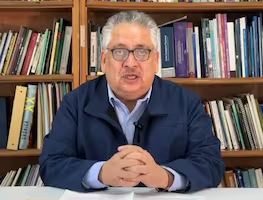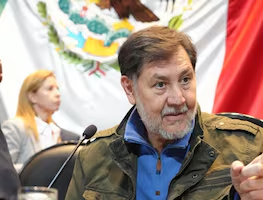Más Información

Primer día de gobierno de Trump; autobús con personas deportadas de EU sale de la garita de Nogales, Sonora

Frente Cívico Nacional denuncia al INE por impedir presentación de nuevo partido; Instituto justifica decisión por seguridad

Ulises Ruiz busca fundar “México Nuevo”; entrega ante el INE solicitud de registro de partido político

Captan a Luis Videgaray en Washington previo a toma de protesta de Trump; reaparece en cena exclusiva del equipo del Presidente

Condena la ONU-DH asesinatos del periodista Calletano de Jesús y del defensor Sergio Cruz; exige investigaciones

Fernández Noroña rechaza declaración de Trump sobre cárteles mexicanos; “inaceptable una invasión militar”, afirma
Mexico
’s lower house of Congress overwhelmingly approved a workers’ rights bill late on Thursday , legislation that U.S. House Speaker Nancy Pelosi considers key to winning over Democrats wary of a revamped North American trade pact.
Pelosi called on Mexico last week to see through the legislation, saying U.S. lawmakers could not even take up the issue unless Mexico put new laws in place to protect workers.
Democratic lawmakers in Washington say the new United States-Mexico-Canada Agreement (USMCA) must ensure workers in Mexico have the right to organize, a step that would require new Mexican labor laws. They believe a major weakness of the 25-year -old North American Free Trade Agreement that the USMCA would replace is that it allowed Mexican wages to stagnate.
The workers’ rights bill was approved by Mexico’s lower house of Congress on Thursday night with 258 members in favor, 67 opposed and 18 abstentions .
The proposal could land in the Senate as soon as next week.
The reform establishes the creation of tribunals in the Federal Judiciary Authority as a substitute for conciliation and arbitration boards. Furthermore, the bill proposes to give life to the Federal Center for Labor Registry and Conciliation (CFCRL) , which will be in charge of solving controversies between workers, employers, and unions, as well as between gild organizations.
Some requirements for the statuses of trade unions will also be modified to uphold democracy in the election of union leaders, which will now be subject to a mandatory election process through free, direct, and secret vote.
Despite the unprecedented proposal, Mexico’s Labor Party (PT) voted against the reform, arguing that it was insufficient to address the needs of Mexican workers.
PT lawmakers deemed that the reform should also include the elimination of outsourcing , which is thought to have increased Mexico’s wage gap in the past decade. “The reform does not measure up to the Fourth Transformation,” said PT deputy Gerardo Fernández Noroña , referring to the government of Andrés Manuel López Obrador.
Mexican President Andrés Manuel López Obrador
said after Pelosi’s comments he does not want to give the United States any motive to reopen negotiations of the pact, which wound up last year.
“It is in our benefit to have this treaty, and for there to be no excuse for opening up negotiations again,”
he said in a regular news briefing on Thursday.
dm





